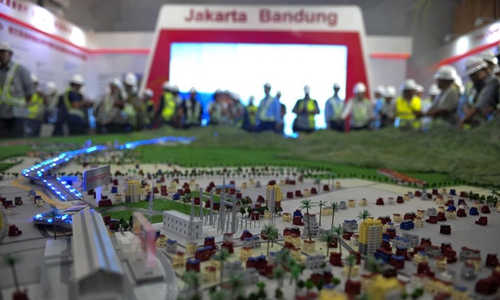
The sand table of the High-Speed Railway (HSR) linking Indonesian capital Jakarta to Bandung is seen in Jakarta, Indonesia, May 2, 2018. (Xinhua/Zulkarnain)
A top Chinese expert in Asian affairs said that the reported combination of the ongoing Jakarta-Bandung railway and the planned Jakarta-Surabaya railway will likely bring Chinese standards to the extended line.
The Nikkei Asian Review reported that the Indonesian government is discussing possible Japanese participation in the combined project.
The Jakarta-Bandung railway is a high-speed line, the first of its kind in Indonesia, with a length of 140 kilometers.
Japan lost the bid for the project to China in 2015, but later won a contract to develop the 750-kilometer rail connection between Jakarta and Surabaya.
"Japanese companies have been conducting feasibility studies but it seems the two sides could not agree on the cost of the project," Xu Liping, a research fellow with the Chinese Academy of Social Sciences, who is familiar with the development of the Jakarta-Bandung railway, told the Global Times on Monday.
"Now the Indonesian government wants to extend the Jakarta-Bandung railway all the way down to Surabaya, as a transportation artery will meet the development interests of the country," Xu said.
The Jakarta-Bandung railway will cut travel time between the two cities to 45 minutes from three and half hours at present.
Because the project that China is participating in is progressing, while the project that would involve Japan is only in the feasibility study phase, the extended part of the Jakarta-Bandung railway would naturally adopt Chinese railway standards if the plan materializes, Xu said.
A source close to the Jakarta-Bandung railway told the Global Times on Monday that the project is already 50 percent finished.
The delivery date of the railway has been delayed to 2021 or later from planned 2020, due to a number of issues including the outbreak of the coronavirus.
Over 60 percent of the length of the Jakarta-Bandung railway involves complicated, extensive tunnel and bridge construction and the project could still advance steadily. Xu said this fact has given Indonesian partners "immense confidence."
"China would be willing to see such an extension, and Japanese companies could play a vital role such as financing the project and future operations," Xu said, adding that China, Japan and Indonesia could iron out a plan for shared development.
However, Xu warned that the extension to Surabaya is about four times longer, and cost and financing are big issues waiting to be tackled.
China and Japan have been committed to jointly developing business opportunities in third markets since 2018.
Japan has traditionally been an important partner in Indonesia's infrastructure development.

